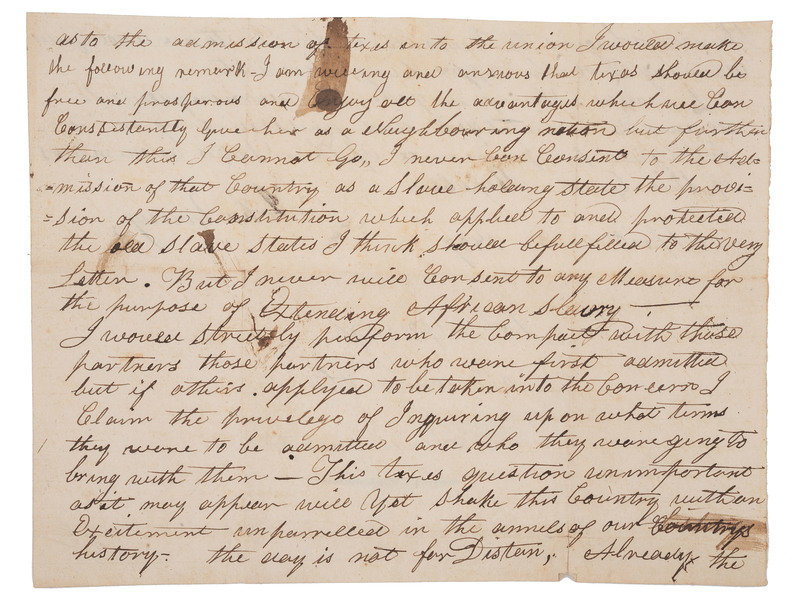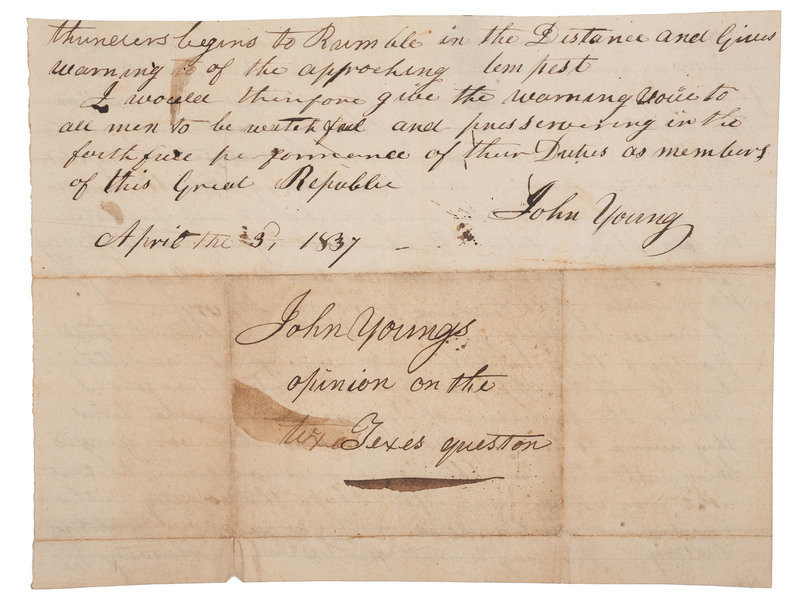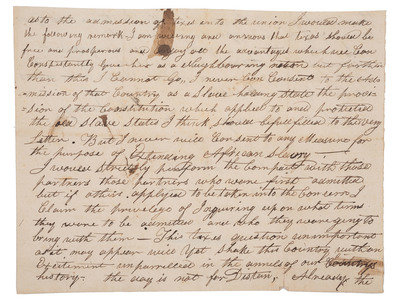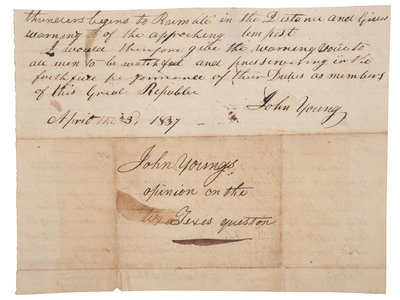Condition Report
Contact Information
Auction Specialist
Lot 84A
[SLAVERY & ABOLITION] -- [TEXAS] -- YOUNG, John (1802-1852). Manuscript "opinion on the Texes [sic] question" signed ("John Young") as U.S. Representative from the state of New York. 3 April 1837.
Sale 1118 - African Americana
Feb 28, 2023
10:00AM ET
Live / Cincinnati
Own a similar item?
Estimate
$500 -
700
Price Realized
Sold
Lot Description
[SLAVERY & ABOLITION] -- [TEXAS] -- YOUNG, John (1802-1852). Manuscript "opinion on the Texes [sic] question" signed ("John Young") as U.S. Representative from the state of New York. 3 April 1837.
2pp, 7 3/4 x 6 in. (ink blots, creasing at folds, small tears near edge lines).
Young, a lawyer and politician, authored this opinion on Texas entering the Union less than a year after the Republic of Texas had earned its independence. The intended purpose and destination of this manuscript opinion is unclear, but Young's stance is clearly stated: "As to the admission of texes into the union, I would make the following remark. - I am willing and anxious that texas should be free and prosperous and Enjoy all the advantages which we Can Consistently give her as a Neighboring nation but further than this I cannot Go, I never can Consent to the Admission of that Country as a Slave holding state the provision of the Constitution which applied to and protected the old Slave states I think should be fullfilled to the very
Letter. But I never will Consent to any Measure for
the purpose of extending African Slavery...." He continues, demonstrating an acute awareness of the enormity of the issue and seemingly fortelling the Civil War to come: "This texes question unimportant as it may appear will yet shake this country with an Excitement unparrelled in the annels of our Country’s history. the day is not far Distant, Already the
thunders begins to Rumble in the Distance and Gives
warning to of the approaching tempest."
John Young was elected as a Whig to the 24th US Congress filling the vacancy left by the resignation of Philo C. Fuller. He held office from 9 November 1836 to 3 March 1837, a period during which the country was beginning to grapple with the possibility of annexing to the United States the new Republic of Texas as a slave state. "The Texas Question" became one of the most controversial issues in American politics during the late 1830s and 1840s, and contributed to an already volatile political climate. Due to the institution of the House "gag rule" in May of 1836, all anti-slavery "petitions, memorials, resolutions, propositions, or papers" were "tabled" without being printed, read, or discussed in the House. Congressional discussion on slavery as it pertained to the "Texas question" was on hold, however, diplomatic relations with Texas were very much being debated during Young's first session on Congress. Young voted "yay" to ensure "that the President of the United States be requested to communicate to this House all correspondence and communications, if any, which have passed between the Executive of the United States and General Santa Anna ... also, all communications and correspondence, if any between the Executive of the United States and General Samuel Houston, or other persons claiming to exercise the powers of Government in Texas" (page 386, Journal of the House of Representatives of the United States, 1836-1837, Monday February 13, 1837). He voted "nay" on a motion with an amendment "for the outfit and salary of a diplomatic agent to be sent to the republic of Texas" (page 548, Journal of the House of Representatives of the United States, 1836-1837, Tuesday February 28, 1837). Young authored the opinion offered here one month after this session of Congress came to an end, perhaps putting to paper his opinion on slavery in Texas because it was not allowed to be openly debated in Congress. His stated argument that slavery could be maintained where it already existed in the states but should not be allowed to spread was the same position articulated by Abraham Lincoln and the Republican Party during the 1850s.
Young was elected again to serve as a Representative in the 27th Congress (1841-1843), served as Governor of New York from 1847-1849, and was appointed assistant treasurer of the United States at New York in 1849. He remained in that position until his death of tuberculosis at the age of 49.
A fascinating and prescient opinion from a politician whose career, if not cut short by his early death, might have destined him for a more prominent role in the national debate over slavery and secession.
This lot is located in Cincinnati.



